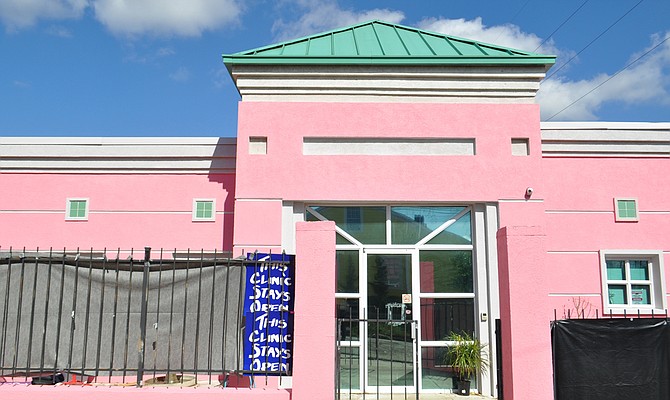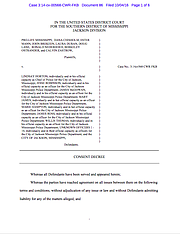The Pro-Life Mississippi protesters and the City of Jackson entered into a consent decree limiting the steps police can take to curtail any aberrant behavior by anti-abortion activists. Trip Burns/File Photo
JACKSON — UPDATE: This story was updated to reflect a statement issued from the Mississippi ACLU.
The director of the bright-pink Jackson Women's Health Organization clinic in Fondren says anti-abortion protesters approach the vehicles of patients visiting the clinic and follow them down the street to their cars, as well as set up on the sidewalks near the facility, often with large signs. The protesters' actions have often attracted the attention of the Jackson Police Department whether from calls from neighbors or the clinic itself, but a new legal agreement may limit what the police can do to curtail their behavior.
Pro-Life Mississippi protesters reached an agreement with the City of Jackson recently in federal court to limit what they say are breaches of their constitutional right to protest. But the two parties did not consult with the clinic's owner, manager or any of the women who visit for treatment.
"I am outraged," Diane Derzis, owner of JWHO, said during an Oct. 6 interview. "Absolutely outraged. Don't you think that the City of Jackson should have contacted the only abortion clinic in the state? They have taken away every right I have. They have put my staff in danger. And the first thing I did was call my lawyer."
The people inside the clinic must have a voice, the clinic's owner added.
"This is unconscionable," Derzis said. "I never heard a word from a single policeman, a single official, and they made this decision without making us aware of it. I have to find out by reading the newspaper. I am pissed."
The Agreement
The consent decree, entered into the federal-court docket for the case on Oct. 4, ends a two-year-long court battle between the City and the protesters, referred to as "anti's" by the clinic operators.
The terms of the consent decree dictate that the Jackson Police Department have agreed not to interfere with certain "First Amendment rights" of the anti-abortion demonstrators. This includes "holding signs and speaking and/or preaching on the public sidewalks and right-of-ways;" doing so while "letting the held signs rest on the sidewalk" next to the speaker, "provided that the sign does not cover the entire width of the sidewalk.
The consent decree says that protesters with medical conditions or who are elderly can sit on a stool on the sidewalk with a sign next to them, "provided that neither the sign or stool or combination cover the entire width of the sidewalk."
JPD must also return all the signs confiscated over the years, and the City agreed to pay $2,500 to Pro-Life Mississippi. The group's organizers declared the victory in an emailed statement, declining to comment over the phone because of past experience, a representative stated, of their words being "twisted" by media.
"By signing the Consent Decree with the award of damages, the City of Jackson has acknowledged that we have been subjected to disparate treatment and that our Constitutional rights have been violated at the site of Jackson Women's Health Organization," the statement emailed to the Jackson Free Press from Pro-Life Mississippi board member Judy Batson explained.
"Pro-Life Mississippi is a peaceful organization," the statement added.
"We are pleased to know our rights will be respected going forward as we carry out our mission of sharing information with the vulnerable women as they enter this facility," the group stated.
The Consequences
Shannon Brewer, the director of the clinic, said during an Oct. 7 interview that she is concerned about the safety of all involved, even the protesters.
"I just really feel like they have basically told them that they can do whatever they want to do, and there will be no repercussions behind it," Brewer said.
Brewer said that the protesters became bolder since the consent decree, even blocking the entrance to the clinic—behavior that has occasionally occurred in the past.
"Normally, when our patients are coming in, (the protesters are) either standing in the middle of the driveway, or they'll wait until a car is getting ready to turn in, and they will pretend like they are walking across the driveway real slow to stop the car," Brewer said. "The car stops in the street, then they run to the car and start trying to throw pamphlets at them."
"They chase them down the street, and the patients tell them to leave them alone, and they keep chasing them, and they do anything they want to do," Brewer said.
Brewer said that she worries for the safety of all involved, especially now that the consent decree muddies the water on what behavior is allowed and what is not.
Matt Steffey, law professor at the Mississippi School of Law, said that the City has the ability to limit free-speech actions in the interest of safety.
"The government is always free to make reasonable time, place and manner restrictions on speech even in a traditional public forum of the sidewalk," Steffey said. "But they have to be content-neutral."
"Certainly getting on and off the sidewalk, letting the traffic go by are legitimate government interests," Steffey said, adding that those sorts of safety requirements fall under those courts normally allow. "If the Americans with Disabilities Act requires a certain area to be clear then that is a reasonable time, manner or place restriction."
The Mississippi ACLU issued a statement late on Oct. 11, also referencing the government's ability to limit the conditions of free speech.
"Our position is that the Bill of Rights guarantees that all citizens are free to exercise freedoms of speech and assembly, without regard to whether the content of speech or exercise of assembly is what we would like to hear," Zakiya Summers, director of communications for Mississippi ACLU, wrote in an email to the Jackson Free Press. "Municipalities have full discretion to prohibit rallies from taking place at unusual hours or from blocking pedestrian or vehicle traffic.
"The courts have generally found that time, place, and manner restrictions are permissible because such regulations serve to ensure the safety and order of the community at-large," the statement continues. "On public sidewalks, demonstrating groups should leave room for passers-by and should not block the flow of pedestrian traffic as noted in the consent decree."
The question is, with the new consent decree, where is that line between safety and permissible free speech? Derzis for her part feels completely left out of the discussion.
"They're standing out there, now they are in the driveway," Derzis said. "What the City has done is declare a free-for-all in front of my clinic. In front of my legally operating, tax-paying business. And they didn't have the balls to call me."
Email city reporter Tim Summers, Jr. at [email protected]. See more local news at jfp.ms/localnews.
More stories by this author
- DA Smith Wins on One Count, But Passes on 'Whistleblower' Bad Check Claims
- Mayor Yarber, Socrates Garrett Address Contracting Dispute, 'Steering'
- UPDATED: Jury Finds Allen Guilty for Cell-phone Payment, Not Guilty on Nine Counts
- Allen Trial: Defense Rests After Making Case DJP Doesn’t Collect 'Taxes’
- DJP Board Attorney Gibbs Takes Stand to Defend Ben Allen's Actions



